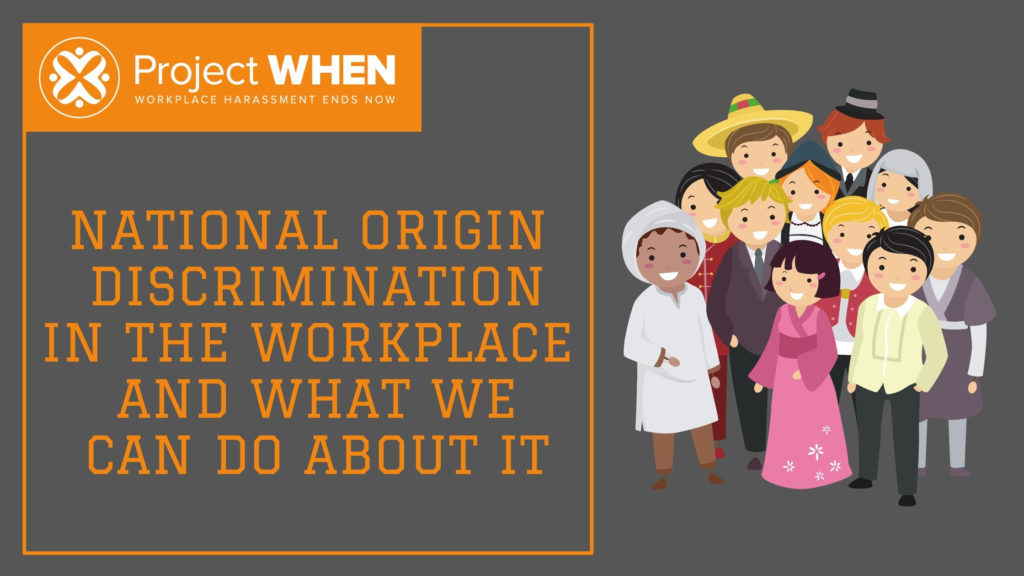National origin discrimination: How companies can prevent it and what employees can do if it happens

Awareness against national origin discrimination
 Are you a victim of national origin discrimination or have you observed it happening in your workplace? Let’s explore some facts that you should know in order to handle it.
Are you a victim of national origin discrimination or have you observed it happening in your workplace? Let’s explore some facts that you should know in order to handle it.
Our mission at Project WHEN (Workplace Harassment Ends Now) is to elevate awareness to eliminate harassment and create more respectful workplaces. This post on national origin discrimination is part of our series of pages educating the public about various types of workplace harassment, how employers can prevent it, and employees’ rights under the law.
What is national origin discrimination?
National origin discrimination occurs when an applicant or employee is treated unfairly due to their ancestry, country of origin, culture, ethnicity, linguistic distinction or accent, or because they look and sound like they are from a certain ethnic group or foreign place.
It can also happen when an individual is discriminated against because of their association with someone of a specific national origin or affiliation with an ethnic group.
In this post, we’ll touch on real examples of national origin discrimination, the laws offering protection from it, and the recourse victims have under the law.
Importantly, we’ll also cover what employers can do to prevent it from occurring in the workplace, along with delving into what companies should do to address discrimination claims. You’ll also find a number of resources we feel are helpful for those dealing with this problem.
Examples of national origin discrimination
 As defined earlier, discrimination based on national origin has different manifestations. It can happen to an individual, but in some instances the act can be systemic, affecting an entire group of people who belong in a protected class.
As defined earlier, discrimination based on national origin has different manifestations. It can happen to an individual, but in some instances the act can be systemic, affecting an entire group of people who belong in a protected class.
In a recent case handled by the U.S. Equal Employment Opportunity Commission (EEOC), a group of African security personnel working in a security services firm was subjected to a systemic national origin discrimination and retaliation. The project manager unreasonably paid attention to the number of African employees (which was half of the team) and decided that they needed to be fired to limit their participation in the contract.
Additionally, the manager harassed the employees by mocking their accents, imposing leave restrictions, and forcing them to work even on their days off. The African employees were forced to endure the manager’s increased scrutiny, persistent threats of termination, and baseless misconduct accusations.
Complaints sent to the company were ignored and the employees faced retaliation instead; their hours were reduced, they were reassigned to less desirable posts, falsely charged of workplace misconduct, and were fired. To settle the lawsuit, the firm paid $1,600,000 to the victims and was ordered to comply with other legal requirements.
Some people may start to receive adverse employment action due to lack of English language proficiency even if it is not required to satisfactorily accomplish their job. This is what a woman from El Salvador experienced when she worked in a company that provides environmental, security, facilities maintenance, and other services.
After two months of working as a part-time cleaner and being supervised by a Spanish-speaking supervisor, an environmental services director offensively commented on her limited English-speaking skills. She was eventually fired by the director, and gave her an ultimatum to learn perfect English within 30 days to be reinstated. Since a violation of Title VII has occurred, the company paid $37,500 in monetary relief to the employee.
According to the EEOC, an employer may not ban employees from using their native language or establish an “English-only” policy in the workplace if it is not required to effectively and efficiently perform their jobs. There are other situations in which national origin discrimination can occur. More details about this will be discussed later on in this post.
Statistics on national origin discrimination
Every year, the EEOC receives thousands of claims and charges alleging national origin discrimination. According to statistics from the federal agency, filings related to national origin discrimination reached 7,009 in fiscal year 2019 which decreased by 1.37% compared to records in FY 2017. This figure does not include charges filed with state or local Fair Employment Agencies, not to mention cases that go unreported.
It is evident that this problem still persists today. Employers may think that their actions do not have serious consequences and victims may not have a clear understanding of protections available to them. Awareness is of utmost importance, first and foremost, in these situations. Read on to explore what laws protect you from it, as well as key actions to take by both companies and victims in dealing with this type of discrimination.
National origin discrimination laws
Federal law
The EEOC enforces several laws that make it unlawful for employers to discriminate against an individual because of national origin.
Title VII of the Civil Rights Act of 1964
 One of the federal laws offering protection against national origin discrimination is Title VII of the Civil Rights Act of 1964. Under Title VII, it is illegal for an employer to base employment decisions (hiring, firing, pay, job assignments, promotions, layoff, benefits, etc.) on an individual’s national origin, as well as race, color, religion, or sex.
One of the federal laws offering protection against national origin discrimination is Title VII of the Civil Rights Act of 1964. Under Title VII, it is illegal for an employer to base employment decisions (hiring, firing, pay, job assignments, promotions, layoff, benefits, etc.) on an individual’s national origin, as well as race, color, religion, or sex.
This law also prohibits the act of harassing someone because of national origin. Harassment in this context can come in the form of humiliation and offensive or derogatory remarks. It is important to note, however, that one-off teasing and isolated incidents (unless extremely serious) may not be considered illegal. The offensive behavior must create a threatening and hostile work environment or result in adverse employment action to be unlawful.
Title VII also protects individuals who have been discriminated against or harassed because of their perceived national origin even if the perception turned out to be incorrect. For instance, subjecting an employee to persistent harassment because the employer thinks he’s Mexican (even if he’s not really Mexican) is still considered illegal.
Furthermore, employers are prohibited from retaliating against individuals who assert their rights and oppose discriminatory practices based on national origin.
The law applies to business/private employers with 15 or more employees, employment agencies, state or local governments, federal government agencies, and labor organizations or joint apprenticeship committees. The law’s protection extends to all applicants and employees (Americans and those who are not American) working in covered entities.
Below is an excerpt from Title VII of the Civil Rights Act of 1964 pertaining to national origin discrimination.
|
Title VII of the Civil Rights Act of 1964 DISCRIMINATION BECAUSE OF RACE, COLOR, RELIGION, SEX, OR NATIONAL ORIGIN SEC. 703. (a) It shall be an unlawful employment practice for an employer– (1) to fail or refuse to hire or to discharge any individual, or otherwise to discriminate against any individual with respect to his compensation, terms, conditions, or privileges of employment, because of such individual’s race, color, religion, sex, or national origin; or (2) to limit, segregate, or classify his employees in any way which would deprive or tend to deprive any individual of employment opportunities or otherwise adversely affect his status as an employee, because of such individual’s race, color, religion, sex, or national origin. (b) It shall be an unlawful employment practice for an employment agency to fail or refuse to refer for employment, or otherwise to discriminate against, any individual because of his race, color, religion, sex, or national origin, or to classify or refer for employment any individual on the basis of his race, color, religion, sex, or national origin. (c) It shall be an unlawful employment practice for a labor organization– (1) to exclude or to expel from its membership, or otherwise to discriminate against, any individual because of his race, color, religion, sex, or national origin; (2) to limit, segregate, or classify its membership, or to classify or fail or refuse to refer for employment any individual, in any way which would deprive or tend to deprive any individual of employment opportunities, or would limit such employment opportunities or otherwise adversely affect his status as an employee or as an applicant for employment, because of such individual’s race, color, religion, sex, or national origin; or (3) to cause or attempt to cause an employer to discriminate against an individual in violation of this section. (d) It shall be an unlawful employment practice for any employer, labor organization, or joint labor-management committee controlling apprenticeship or other training or retraining, including on-the-job training programs to discriminate against any individual because of his race, color, religion, sex, or national origin in admission to, or employment in, any program established to provide apprenticeship or other training. |
Immigration Reform and Control Act of 1986
The Immigration Reform and Control Act of 1986 (IRCA) is another federal law that covers national origin discrimination. IRCA is an amendment to Immigration and Nationality Act (INA) that prohibits employers from discriminating against individuals on the basis of citizenship or immigration status.
Under this law, an employer may not refuse to hire a person who is legally eligible to work in the United States regardless of their immigration or citizenship status. A single exception to this rule is when a law, regulation or government contract states that U.S. citizenship is required for a specific job.
When verifying if an individual is eligible for employment, it is illegal to disregard documents proving a person’s employment eligibility or ask for additional or different documentation than what is required by the law.
Retaliation is also prohibited under IRCA, which means that no employer can retaliate against an individual who filed a charge or is actively participating in a legal investigation/proceeding under the Act.
State Law
Some states have laws that protect individuals from national origin discrimination. The best way to learn more about additional protections you can receive locally is to refer to your state’s department of labor website. Our guide on reporting incidents of workplace harassment links to each state’s DOL website, as well as some of the regional and city organizations, for those in more populous areas.
Recourse for victims of national origin discrimination
Victims of national origin discrimination in the workplace have the right to seek legal recourse. If you have already reported it to your company’s HR and you are not seeing any signs of moving forward, you have the option to consult legal counsel or an employment lawyer. These professionals can help you evaluate the case and provide valuable advice regarding your claims.
A best next step could also be filing a charge either through your state administrative agency or the EEOC, a federal agency that enforces federal laws related to harassment and discrimination in the workplace. Acting promptly is important since victims have 180 days to file a charge with the EEOC while federal employees have 45 days to contact an EEO Counselor.
You are not required to speak with an attorney before approaching a government agency to discuss your situation; these entities are in place to protect your rights as an employee and are typically willing to give guidance on suggested next steps for you as a victim.
For further details about the process of reporting national origin discrimination cases, refer to our full guide on How to Report Workplace Harassment Incidents. This article provides a comprehensive list of state resources and local EEOC offices. You can also head directly to the EEOC’s page on How to File a Charge of Employment Discrimination.
What can companies do to prevent national origin discrimination?
Companies have the responsibility to prevent discrimination and retaliation from transpiring in the workplace. With the right mix of properly enforced policies and a holistic examination of business processes and culture, developing a respectful work environment is a possibility for any organization.
The initiative to prevent this type of discrimination must start with senior leadership, but sometimes change takes one individual who has the courage to speak up. If you are passionate about ensuring the safety of employees from the different manifestations of discrimination, consider getting your company involved with Project WHEN (Workplace Harassment Ends Now).
As a first step, we’d ask you to sign our Pledge of Commitment to demonstrate your commitment to creating a respectful, harassment-free workplace for your employees.
For a holistic and structured approach to living out your commitment, we would encourage you to enroll in the WHEN™ Organizational Certification program. In this program, we will guide you through a step-by-step process of preventing all types of workplace harassment. This certification will also serve as a powerful statement to both internal and external audiences about your commitment to making your workplace a safe space for everyone. The Employee Culture Pulse Survey, which is also offered as a standalone service, will be administered to employees in the first phase of this program. The actionable data gained from this survey will allow you to identify challenges in your fight against workplace harassment and strategize your path to improvement.
What should companies do when national origin discrimination happens?
 Acts of discrimination happen when companies lack understanding of requirements set forth by the law and do not implement preventive measures. When tell-tale signs of hostility are observed within the organization, it is time to start dismantling it by engaging in meaningful conversations and breaking the status quo.
Acts of discrimination happen when companies lack understanding of requirements set forth by the law and do not implement preventive measures. When tell-tale signs of hostility are observed within the organization, it is time to start dismantling it by engaging in meaningful conversations and breaking the status quo.
If you are ready to begin discussions on creating a more respectful work environment, we can facilitate a Project WHEN Roundtable. This event can help attendees identify challenges present in their current working conditions and gain insight on the best action steps to eliminate traces of discrimination in the workplace.
If you are an individual who thinks that it is time to see change happening in your company, let your employer know about this and ask for a facilitated discussion to take place.
Remember, the problem of national origin discrimination will not solve itself. It is important for everyone to develop heightened awareness of what they can do to make a difference. Change will only take place if people within the workplace take the initiative to address issues, no matter how uncomfortable it may be.
Additional resources and recommended readings
For more information about national origin discrimination, we’ve rounded up some resources that you can consult and find below.
- National Origin Discrimination | U.S. Equal Employment Opportunity Commission
- National Origin Discrimination | U.S. Department of Labor
- National Origin Discrimination – FAQs | EEOC
- Facts about National Origin Discrimination
- Questions and Answers for Employees: Responsibilities Concerning the Employment of Individuals Who Are, or Are Perceived to Be, Muslim or Middle Eastern
End national origin discrimination now
Nobody should have to face national origin discrimination or any form of harassment, for that matter. Project WHEN is a 501(c)(3) nonprofit organization working hard to make workplaces more respectful for everyone. Elevating awareness to prevent workplace harassment from taking place is what runs at the core of our organization.
Whether you’d like to make a financial contribution to support our work, sign the Project WHEN Pledge of Commitment, have your employer host a Project WHEN event, or just join our mailing list to learn of volunteer opportunities, everyone can get involved with Project WHEN!

